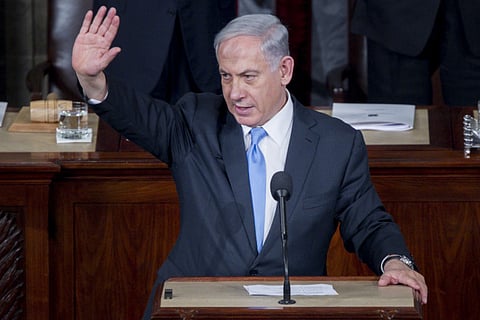Rejecting a nuclear deal with Iran now would leave it unconstrained
Constraining Iran’s nuclear capability in meaningful, verifiable ways is the right goal, and compromise to achieve this goal is the right method

UN Security Council resolutions dating to 2006 have demanded that Iran suspend its enrichment of uranium, which can be used for bomb making as well as electricity. Israel and many of its supporters in Congress insist that Iran be left with no enrichment capability whatsoever, a hard line that will doom an agreement. The Obama administration and its negotiating partners — China, France, Germany, Russia and Britain — have shifted from suspension to allowing enrichment for electricity under observable constraints.
In 2013, Iran agreed to suspend enrichment above 5 per cent and to blend down or convert its existing 20 per cent stockpile. (Enrichment at 90 per cent is used for bombs.) Iran also agreed to suspend new installations of centrifuges and allowed international inspectors at its production facilities. (Israeli Prime Minister Benjamin Netanyahu characterised all this as “the deal of the century” for Iran, although he subsequently acknowledged its utility.)
The comprehensive agreement under consideration allows 5 per cent enrichment to continue in quantities limited to the operation of perhaps 6,500 first-generation centrifuges. Iran is known to have about 19,000 centrifuges at two sites — most standing idly by — with the production capacity to make more, and more efficient models.
Those terms have been subject to withering criticism. Heavyweight and bellwether Henry Kissinger has weighed in against the administration’s negotiating tactics. The goal, he says, is no longer denying Iran the capability to develop a military nuclear option but rather haggling over the scope of that capability. “The impact of this approach,” Kissinger argues, “will be to move from preventing proliferation to managing it.”
Kissinger is railing against the standard negotiating practice of moving away from stringent, unrealistic opening gambits in order to find mutually acceptable common ground. He employed these very tactics and was roundly criticised for them in strategic arms limitation accords with the Soviet Union. Constraining Tehran’s nuclear capability in meaningful, verifiable ways is the right goal, and compromise to achieve this goal is the right method. It’s the best way to address Israel’s concerns and dampen proliferation elsewhere in the Middle East.
What matters most at this stage of the negotiations is how much Iranian nuclear capability is allowable. The Obama administration has defined this as Iran’s having the ability to make a usable nuclear weapon within a year. The package of constraints under negotiation is designed to prevent this “breakout” scenario, establishing interlocking, verifiable constraints on centrifuge operations to prevent Iran from building a weapon within this timeline.
Can it work? Yes: International inspections at declared nuclear facilities and access to undeclared, secret facilities can provide early warning if Iran sprints for nuclear weapons.
Some argue that creating constraints against a one-year time frame is too exacting; others that it is not nearly exacting enough. If Iran violates its commitments, lining up the requisite will and support for remedial actions among the US and its negotiating partners could take months. The current example of France and Germany’s reluctance to draw a hard line against Russian President Vladimir Putin’s encroachments in Ukraine makes it clear that a long lead time is required. A one-year timeline is about right.
Those who oppose an agreement that limits Iran’s enrichment capability in verifiable ways or indeed any agreement — led by Netanyahu, who was given a megaphone with House Speaker John A. Boehner’s invitation to speak to Congress — are obligated to explain how rejecting such a deal or ending negotiations now would advance US national, regional and international security interests.
How, for example, would rejecting an agreement that curtails Iranian enrichment affect proliferation prospects in the greater Middle East? Instead of providing answers opponents take refuge in legislation for tougher sanctions. Sanctions have been an effective tool to engage a deal-minded government in Iran, but sanctions _ no matter how tough _ will not shut down Iran’s enrichment activities.
If Tehran were to expel international monitors in reaction to the failure of negotiations or the rejection of a deal, the “no enrichment” agenda could lead to bombing runs on Iranian facilities — strikes that Netanyahu would prefer the US to undertake. These air strikes would have to be repeated periodically, each time with diminished support. Air strikes by Israel or the US following a Congressional rejection of an agreement to limit Iranian enrichment would place Washington in an untenable position globally.
Constraining Iran’s nuclear programme in effective, verifiable ways is far better than leaving it unconstrained and unmonitored. Iran’s capabilities have already fuelled nuclear ambitions in the greater Middle East. There are plans to proceed with nuclear power plants, the first step Iran took before building companion enrichment facilities, in Saudi Arabia, Turkey and Egypt. The extent of these plans will depend on the extent to which Iran’s nuclear capacity is limited.
The agreement the Obama administration seeks would have a less pernicious effect on proliferation than would torpedoing it. Those who oppose this or any agreement with Iran invite more nuclear proliferation in the Middle East.
— Los Angeles Times
— Michael Krepon is the author of Better Safe Than Sorry: The Ironies of Living With the Bomb.



